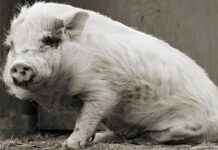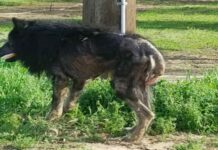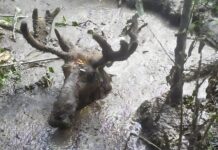On the morning of May 28, 2016, personnel at Bumi Hills Safari Lodge in Zimbabwe were astonished to find a bull elephant with a pronounced limp outside one of the staff homes. A deeper examination revealed that he had been the victim of a botched poaching attempt. He was shot twice in the left ear and has a septic wound on his left shoulder.
Despite the painful-looking gash on his shoulder, the bull, estimated to be at least 30 years old, had made his way up the steep slope to the lodge during the night. He was plainly dehydrated because he drank the three gallons of water we offered him and had not left the house in about five hours. Perhaps the elephant was aware that we could assist.


Dr. Richard Hoare, a wildlife veterinarian, was flown in to the resort that afternoon to deliver the essential life-saving therapy. After being darted, the entire treatment took a little more than an hour, during which the vet and employees cleaned and disinfected his wound, checked for bullet traces, and administered medicines.
Ben was also put with a VHF tracking collar so that we could closely monitor him and more readily administer follow-up therapy in a few weeks. A group of elephant cows and calves watched with interest as Ben had his second treatment.
Although the lesion was still infected, it had healed effectively and the swelling had subsided. Ben was given another dosage of long-acting antibiotics, as well as anti-inflammatories, pain relievers, and a vitamin boost, to assist in the healing process. X-rays of his scapula were obtained, but because to the size and difficult position of the region, they were inconclusive, and the source of the wound remains unknown.



Ben’s tracking collar was removed before the reversal medicine was administered, and he was back on his feet in 5 minutes, moving across the floodplain to join a nearby herd.
Many months later, Ben has recovered completely and looks to be a happy and robust bull. We’ll never know if Ben showed up at the staff residences searching for aid or if it was merely accidental.
We are incredibly humbled by this courageous elephant and the support shown through our dedicated campaign #helpben, which raised $5,000 for his medical bills. We may have had a completely different outcome today if not for the help of our neighboring neighborhood and our internet followers!
According to data collected during aerial surveys over Zimbabwe in 2001 and 2013, there has been a 75% decrease in elephant numbers in the Sebungwe area, which essentially stretches the length of Lake Kariba and includes inland areas such as Matusadona and Chizarira National Parks. These concerning data prompted the establishment of the Bumi Hills Foundation in March 2016. The foundation will primarily focus on local community development activities like as healthcare, education, and economic empowerment, while continuing to carry out critical conservation work through the newly formed Bumi Hills Anti-Poaching Unit.






